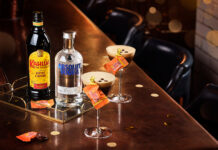Licensees can tempt customers with the right cocktail offer all year round, say drinks firms
COCKTAILS have taken the trade by storm in recent years, proving popular everywhere from rural pubs to city centre bars.
And they are anything but a seasonal trend, say drinks firms, who have insisted that, as the days become shorter and the nights colder, licensees can expect demand for cocktails to remain high.

As bars and pubs “continue to experience a cocktail boom”, a spokeswoman for Halewood Wines & Spirits said “it’s unlikely that the change in weather will dampen people’s appetite to enjoy something special”.
And so getting an outlet’s cocktail offer right is more crucial than ever, according to Faith Holland, head of on-trade category development at Diageo GB, who said cocktails now account for 6% of all spirits sales in the UK.
To continue tapping into the consumer demand for cocktails, a seasonally appropriate list must be on offer, according to Halewood.
But the firm was adamant that operators needn’t start from scratch when it comes to their winter cocktail list.
Halewood’s spokeswoman said that “welcoming a new season isn’t about starting again”, and instead it is more about “experimenting with switching summer fruits for winter, and unflavoured vodka for flavoured”.
She added: “Dark nights don’t have to mean just dark drinks.
“Gin still remains a winter-friendly staple and the vodka boom has secured its place firmly on this year’s winter cocktail list.”
Winter isn’t about eliminating refreshing tastes, but adding warming flavours.
However the spokeswoman added that darker spirits do still have their place on the cocktail list, as they are “often richer and silkier and add depth of flavour”.
Lisa Harrison, director of cocktail machine supplier TenderOne UK, took a similar stance on winter cocktails.
She reckoned that “simple, seasonal twists” on classic cocktail recipes is the way to go when changing up your seasonal offer.
“Winter shouldn’t be about eliminating refreshing drinks but instead making them more seasonally appealing,” said Harrison.
“Try replacing white rum for dark rum in your Daiquiri or add a smoky whisky to your Martini.”
And she added that “unexpected ingredients”, such as honey or maple syrup, are especially great for the autumn season.
Yet Harrison advised licensees to ensure they “maintain a few tropical serves” that can help customers “combat the winter blues”.
Cognac should be another consideration for licensees’ cocktail menus, according to Matthias Lataille, brand ambassador for Martell at Pernod Ricard UK, who said overall on-trade sales of Cognac are currently in growth.
He said: “There is a huge opportunity for on-trade retailers to execute and inspire customers with a seasonal cocktail menu featuring some favourite Cognac-inspired recipes.”
And Lataille added that consumers are increasingly curious about what is going into their cocktails.
He said: “There is also a growing intrigue amongst consumers about ingredients, methods and new ways of interacting with their drinks.”
As consumers wish to find out more about the cocktails on offer, and the spirits, liqueurs and syrups used in them, good bartender knowledge can pay dividends for licensees, according to Halewood.
The company’s spokeswoman said that “solid bartender education is key to driving uptake in the on-trade”.
“Consumers are selecting their drinks based on creativity, intelligence and authenticity,” she said.
“It’s vital the operator understands the product and the heritage so they can help customers make informed decisions.”
But while this is a key factor in encouraging customers to try new cocktails, not everyone is willing to experiment.
Rob Poulter, on-trade consultant at Diageo, said the cocktail consumer will fall into one of two categories: those who actively seek new and innovative cocktails in the trade; and those that wish to stick to their favourite serves.
Poulter emphasised that, across every season, outlets need to accommodate both types of consumer.
He said: “Consumers who repeatedly opt for their favourite cocktails amount for three quarters of cocktail drinkers, so licensees can capitalise on trends and repeat purchase by maintaining favourites on the menu.”
However, Poulter added that nearly a third of the more ‘experimental’ cocktail drinkers who seek out new and interesting serves are likely to buy cocktails that contain premium spirits, so “licensees have a clear opportunity to upsell and improve profits”.























